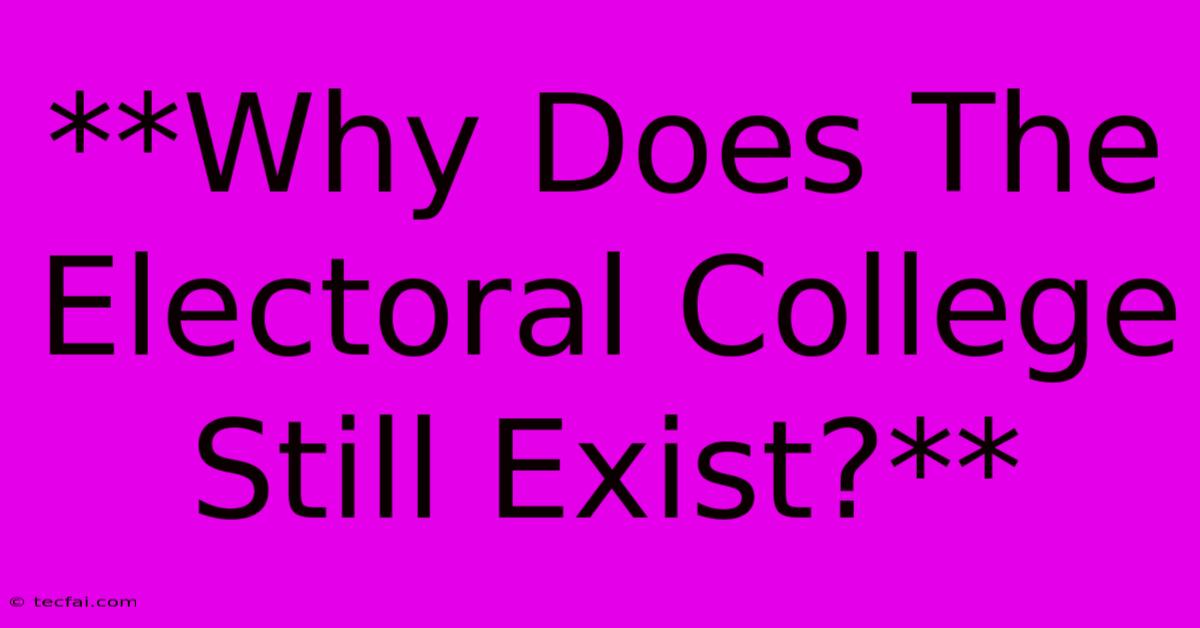**Why Does The Electoral College Still Exist?**

Discover more detailed and exciting information on our website. Click the link below to start your adventure: Visit Best Website tecfai.com. Don't miss out!
Table of Contents
Why Does The Electoral College Still Exist? Unpacking a Complex System
The Electoral College, a unique feature of the American political system, has been a topic of heated debate for decades. With its occasional discrepancies between the popular vote and the presidential winner, many question its relevance in the 21st century. But why does this seemingly archaic system persist?
A Historical Perspective: Compromising on Power
The Electoral College was established during the Constitutional Convention of 1787, a pivotal moment in American history. The Founding Fathers faced a dilemma: how to balance the power of larger states with the interests of smaller, less populous ones.
The Compromise: The Electoral College emerged as a compromise, addressing concerns about direct democracy and ensuring that a smaller number of states wouldn't be overpowered by larger ones. It also reflected a fear of mob rule and the potential for unqualified individuals to rise to power.
The Mechanics of the Electoral College
Here's how it works:
- Each state is allocated a number of electors based on its total population. This includes its representatives in the House of Representatives and its two senators.
- The winner of the popular vote in each state typically wins all of its electoral votes. This is known as the "winner-take-all" system, though Maine and Nebraska utilize a proportional system.
- A candidate needs 270 electoral votes to win the presidency.
Arguments for and Against the Electoral College
Arguments in Favor:
- Protects the interests of smaller states. It ensures that a candidate cannot win simply by focusing on heavily populated areas.
- Encourages candidates to campaign across the country. Candidates are forced to appeal to a wider range of voters, not just those in large urban centers.
- Reduces the possibility of a single candidate winning by a landslide. This helps prevent the potential for a dominant party from suppressing the rights of the minority.
Arguments Against:
- Can result in a candidate winning the presidency without winning the popular vote. This has happened five times in U.S. history, most recently in 2016.
- Disproportionately favors certain states. States with a smaller population have a greater impact on the outcome of the election than states with larger populations.
- Undermines democratic principles. The system allows for a candidate to win the presidency even if they do not receive the majority of votes cast.
Moving Forward: The Debate Continues
The debate over the Electoral College is likely to continue for many years to come. Supporters argue that it safeguards the interests of all states and fosters a more balanced political landscape. Critics, however, contend that it undermines democracy and disenfranchises voters in certain areas.
Ultimately, the future of the Electoral College will depend on the will of the American people and their elected representatives. Whether it remains a cornerstone of the American political system or becomes a relic of the past, the debate surrounding its existence is sure to remain a prominent part of the national discourse.
Keywords: Electoral College, U.S. elections, presidential elections, popular vote, winner-take-all, compromise, democracy, political system, Founding Fathers, debate, history, advantages, disadvantages, reform, future.

Thank you for visiting our website wich cover about **Why Does The Electoral College Still Exist?**. We hope the information provided has been useful to you. Feel free to contact us if you have any questions or need further assistance. See you next time and dont miss to bookmark.
Featured Posts
-
Palantir Stock Rises On Q3 Earnings Beat
Nov 05, 2024
-
Classical Music For Guy Fawkes
Nov 05, 2024
-
Escape Overtourism 10 European Destinations
Nov 05, 2024
-
Newsom Statement On Quincy Jones Passing
Nov 05, 2024
-
Louisiana Election Map Faces Supreme Court Review
Nov 05, 2024
